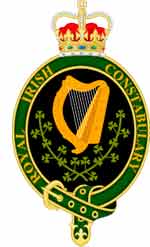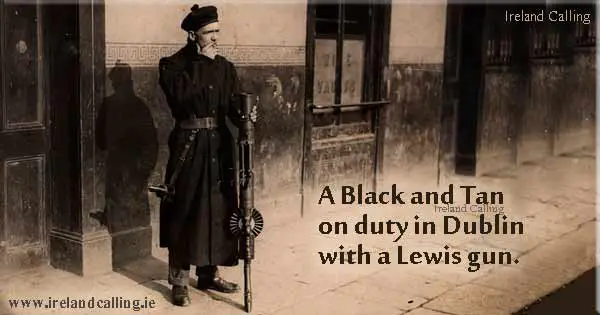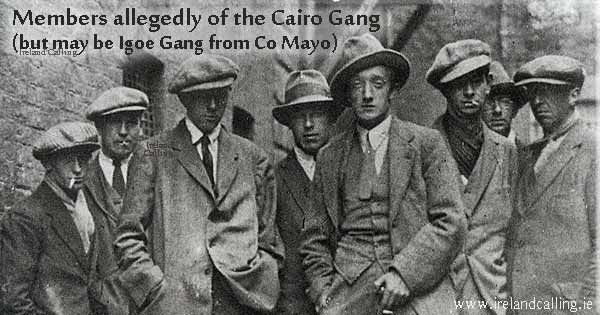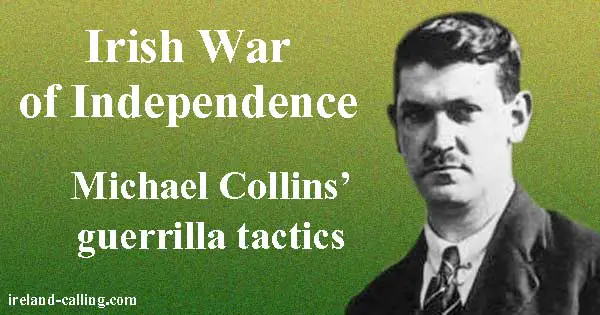The Irish War of Independence began with sporadic attacks on British officials carried out by the IRA around Ireland.
The members of Sínn Féin were not united in their stance on the violence. Éamon de Valera wanted a traditional military campaign between the IRA and Britain. Arthur Griffiths preferred a general behaviour of civil disobedience, rather than outright violent attacks.
Michael Collins, Minister for Finance for Sínn Féin and also head of intelligence for the IRA, disagreed with both.
He had fought in the Easter Rising and seen first-hand how the military naivety of the Irish rebels left them exposed and defenceless against the might of the British Army.
Collins knew where the British were vulnerable
Collins knew that the IRA couldn’t match the British forces for numbers or weaponry.
To level the playing field, he ordered his men to attack small groups of British troops in short, sharp bursts, and then flee back into the side-streets and alleyways.
This way, the British never had enough time to respond to an attack and couldn’t use their military might to the full. By the time the alarm was raised over an attack, the IRA members had disappeared back into hiding.

Collins amassed a series of spies and informers in the British forces. He knew where the British were vulnerable, and ordered his troops to maximise their opportunities.
Royal Irish Constabulary (RIC) stations were regularly targeted, as they were often isolated and under-manned.
Attacks on these stations both raised the profile of the Irish war, and the morale of their soldiers. They were also fruitful sources for stealing arms and explosives.
Collins’ other tactic in the war was to assassinate as many high profile British officials as possible.
These killings made the newspapers in Ireland, Britain and sometimes beyond. They were embarrassing to Britain and so, encouraging for the IRA.
A squad of ultra-assassins was put together by Collins. Most of these were young, fit, nationalist soldiers. They were infinitely loyal to Collins, and saw him as a big brother/father figure.
The members of the squad believed in Collins totally and were willing to risk their lives for him. Several successful attacks on British officials were carried out by Collins’ ‘squad’.
Britain recruited former WWI soldiers to stop IRA
The British responded by increasing their presence in Ireland.
Historians have argued that they made a grave error at this point. Had they appealed to the Irish public for a peaceful resolution, they may well have been successful as the overall feeling was not in support of the violent atrocities being carried out by the IRA.
Instead, the British recruited thousands of World War One veterans to help regain control in Ireland.
These soldiers were issued a mixture of spare British Army and police uniforms as the country was struggling for resources following the First World War.
This resulted in them being dressed in a mish-mash of uniforms, and gained them the nickname the ‘Black and Tans’.

They had a reputation of being drunken, brutal and quick-tempered in their methods of enforcing their authority.
Every IRA attack on a British official was followed up with a Black and Tan rampage of a city, with shots fired randomly through windows and buildings burnt to the ground.
There were many alleged incidents of indiscriminate violent attacks carried out by the Black and Tans on Irish civilians, as they tried to weed out members of the IRA. The behaviour of the Black and Tans turned the public mood back in favour of the IRA and its war.
Cairo Gang were genuine threat to Collins
Whilst the Black and Tans had a reputation of being violent thugs, the British had recruited another team of soldiers who were far more intelligent and cunning.
The Cairo Gang was a group of special British agents, sent to Dublin to gather information on IRA operations and destroy them from the inside.

They were a genuine threat to Collins’ regime, as they could match his military strategy, and worse, could infiltrate his inner circle. They got their name because of their common meeting point, the Cairo Café in Dublin.
Bloody Sunday: a day of horrific violence that shocked the world
